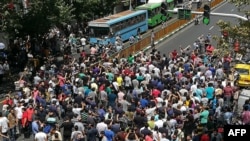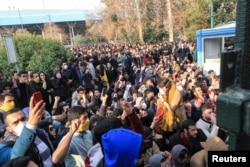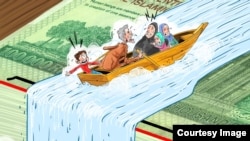The Iranian parliament's research center says a worsening domestic economy means a broader range of Iranians are living in poverty, based on their monthly incomes.
In a report released Tuesday, the parliamentary researchers said the poverty line for a family of four living in the capital city of Tehran rose to a monthly income of 27 million rials in the June to September quarter, or $650, according to Iran's official exchange rate of 42,000 rials to the dollar. A poverty line indicates that everyone earning a monthly income up to that level is living in poverty.
The report said the $650 poverty line for June to September represented a 22 percent increase from the same quarter in 2017. The increase means that Tehran-based families of four with monthly incomes up to 22 percent higher than the previous year's poverty line have fallen into poverty themselves, according to the researchers.
The rial's sharp depreciation against the dollar on the unofficial market this year has caused dollar-denominated imports to become significantly more expensive, making it difficult for more low-income Iranians to buy basic necessities such as food and medicine. TheBonbast.com website that tracks Iran's unofficial exchange rates showed the rial trading at 105,500 to the dollar on Wednesday.
The weakening of the rial has coincided with the United States re-imposing sanctions against Iran in recent months to try to pressure it into ending perceived malign behaviors. In May, U.S. President Donald Trump decided to re-impose U.S. sanctions that had been lifted under a 2015 nuclear deal between Iran and six world powers, including the administration of his predecessor Barack Obama. Trump said the deal did not do enough to prevent Iran from developing nuclear weapons — a goal that Tehran denies having.
Earlier this month, Iran's state-run Fars news agency acknowledged that more Iranians were falling beneath the poverty line by publishing a cartoon on the topic. The Dec. 5 cartoon shows a family of five on a boat, with the head of the household struggling to row against a current dragging the boat toward the edge of a waterfall, marked with a red "poverty line."
Iran president responds
Iranian President Hassan Rouhani also has spoken recently of the economic difficulties facing his nation, as a result of U.S. sanctions on Iran's energy and banking sectors. But in remarks to the media on Tuesday, he said Iran's central bank and business community have been able to grow the nation's exports from March to November and achieve a "tangible peace in society."
In an interview for the Tuesday edition of VOA Persian's News at Nine program Foundation for Defense of Democracies analyst Behnam Ben Taleblu said Iran's worsening poverty has much to do with how its Islamist rulers have been allocating their resources.
"This includes massive tax exemptions for large parastatal institutions and having created off-the-books accounts that divert Iranian money away from the country and toward foreign wars," he said. Tehran has sent troops to Syria and exerts influence over Iranian-allied militants in Yemen, Iraq and Lebanon.
Taleblu said corruption involving government officials and other elites is another major contributor to Iran's poverty.
VOA interview
In a separate interview with VOA Persian, Iranian professor Jamshid Assadi of France's Burgundy Business School said corruption is so endemic that businesses compete with each other to secure privileges from Iranian authorities in return for bribes.
The main way to eradicate Iran's poverty is for the government to ensure that its economic output is growing consistently, Assadi said.
This article originated in VOA's Persian Service. Katherine Ahn and Ramin Haghjoo contributed to this report.







